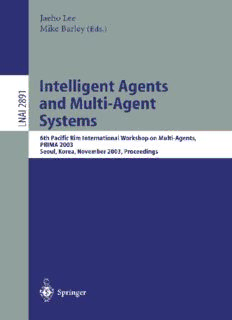
Intelligent Agents and Multi-Agent Systems: 6th Pacific Rim International Workshop on Multi-Agents, PRIMA 2003, Seoul, Korea, November 7-8, 2003. Proceedings PDF
Preview Intelligent Agents and Multi-Agent Systems: 6th Pacific Rim International Workshop on Multi-Agents, PRIMA 2003, Seoul, Korea, November 7-8, 2003. Proceedings
Lecture Notes in Artificial Intelligence 2891 EditedbyJ.G.CarbonellandJ.Siekmann Subseries of Lecture Notes in Computer Science 3 Berlin Heidelberg NewYork HongKong London Milan Paris Tokyo Jaeho Lee Mike Barley (Eds.) Intelligent Agents and Multi-Agent Systems 6th Pacific Rim International Workshop on Multi-Agents, PRIMA 2003 Seoul, Korea, November 7-8, 2003 Proceedings 1 3 SeriesEditors JaimeG.Carbonell,CarnegieMellonUniversity,Pittsburgh,PA,USA Jo¨rgSiekmann,UniversityofSaarland,Saarbru¨cken,Germany VolumeEditors JaehoLee UniversityofSeoul DepartmentofElectricalandComputerEngineering 90Cheonnong-dong,Tongdaemun-gu,Seoul130-743,Korea E-mail:[email protected] MikeBarley UniversityofAuckland DepartmentofComputerScience PrivateBag92019,Auckland,NewZealand E-mail:[email protected] Cataloging-in-PublicationDataappliedfor AcatalogrecordforthisbookisavailablefromtheLibraryofCongress. BibliographicinformationpublishedbyDieDeutscheBibliothek. DieDeutscheBibliothekliststhispublicationintheDeutscheNationalbibliografie; detailedbibliographicdataisavailableintheInternetat<http://dnb.ddb.de>. CRSubjectClassification(1998):I.2.11,I.2,C.2.4,D.2,F.3 ISSN0302-9743 ISBN3-540-20460-1Springer-VerlagBerlinHeidelbergNewYork Thisworkissubjecttocopyright.Allrightsarereserved,whetherthewholeorpartofthematerialis concerned,specificallytherightsoftranslation,reprinting,re-useofillustrations,recitation,broadcasting, reproductiononmicrofilmsorinanyotherway,andstorageindatabanks.Duplicationofthispublication orpartsthereofispermittedonlyundertheprovisionsoftheGermanCopyrightLawofSeptember9,1965, initscurrentversion,andpermissionforusemustalwaysbeobtainedfromSpringer-Verlag.Violationsare liableforprosecutionundertheGermanCopyrightLaw. Springer-VerlagisamemberofSpringerScience+BusinessMediaGmbH springeronline.com ©Springer-VerlagBerlinHeidelberg2003 PrintedinGermany Typesetting:Camera-readybyauthor,dataconversionbyPTP-Berlin,Protago-TeX-ProductionGmbH Printedonacid-freepaper SPIN:10969090 06/3142 543210 Preface Five years ago, with excitement and uncertainty, we witnessed the birth of PRIMA (Pacific Rim International Workshop on Multi-Agents). The first PRIMA in 1998 has now grown into PRIMA 2003, the 6th Pacific Rim Interna- tionalWorkshoponMulti-AgentsinSeoul,Korea.Duringaperiodoffiveyears, the notion of agent research has grown so much that we hear the term agent on a daily basis. Various fields such as business, the Web, software engineering, on-line games and such are now using the term agent as a placeholder, just like the term object is used in the object-oriented paradigm. On the other hand, the research area has extended toward real applications, such as the Semantic Web and ubiquitous computing. The themes of PRIMA 2003 reflected the following trends: – agent-based electronic commerce, auctions and markets – agent architectures and their applications – agent communication languages, dialog and interaction protocols – agent ontologies – agent programming languages, frameworks and toolkits – agentcities – agents and grid computing – agents and peer computing – agents and the Semantic Web – agents and Web services – artificial social systems – conflict resolution and negotiation – evaluation of multi-agent systems – languages and techniques for describing (multi-)agent systems – meta modeling and meta reasoning – multi-agent planning and learning – multi-agent systems and their applications – social reasoning, agent modeling, and organization – standards for agents and multi-agent systems – teams and coalitions – ubiquitous agents PRIMA 2003 in Seoul, Korea hoped to build on the wonderful success of its predecessors, PRIMA 1998 in Singapore, PRIMA 1999 in Kyoto, Japan, PRIMA 2000 in Melbourne, Australia, PRIMA 2001 in Taipei, Taiwan, and PRIMA 2002 in Tokyo, Japan. We received 44 submissions to be considered. Each paper was carefully reviewed by three internationally renowned agent re- searchers chosen from the program committee (PC) members. There were 18 papers selected to be printed in this volume. We would like to thank all the authors for submitting their papers to PRIMA 2003 and the PC members for VI Preface theirdiligenteffortstoreviewthosepapers.Also,wearesogratefultohavehad our invited speakers, Ronald Arkin (Georgia Institute of Technology), Edmund Durfee(UniversityofMichigan),NickGibbins(UniversityofSouthampton),and HiroshiIshiguro(OsakaUniversity).Last,butnotleast,wewouldliketoexpress our thanks to the editorial staff of Springer-Verlag for publishing this volume in the Lecture Notes in Computer Science series and the Institute of Information Technology Assessment (IITA), Korea for their generous financial support for this workshop. November 2003 Jaeho Lee Mike Barley Organization PRIMA 2003 was organized by the Korea Intelligent Information Systems Society(KIISS)andtheElectronicsandTelecommunicationsResearchInstitute (ETRI). General Chair Jin Hyung Kim Computer Science Department KAIST (Korea Advanced Institute of Science and Technology), Korea [email protected] Program Co-chairs Jaeho Lee Department of Electrical and Computer Engineering University of Seoul 90 Cheonnong-dong, Tongdaemun-gu, Seoul 130-743, Korea [email protected] Mike Barley Department of Computer Science University of Auckland Private Bag 92019, Auckland, New Zealand [email protected] Local Organization Co-chairs Ho-Sang Ham Internet Computing Research Department Electronics and Telecommunications Research Institute (ETRI), Korea [email protected] Jung-Jin Yang Department of Computer Science and Engineering Catholic University of Korea, Korea [email protected] VIII Organization Local Organization Committee Soowon Lee (Soongsil University) Suhn Beom Kwon (Dankook University) Hyun Kim (Electronics and Telecommunications Research Institute) Seung Ik Baek (Hanyang University) Program Committee Cristiano Castelfranchi (Italy) John Jules Meyer (The Netherlands) Brahim Chaib-draa (Canada) Luc Moreau (UK) Joongmin Choi (Korea) Joerg Mueller (Germany) John Debenham (Australia) Hideyuki Nakashima (Japan) Klaus Fisher (Germany) Ei-Ichi Osawa (Japan) Chun-Nan Hsu (Taiwan) Ichiro Osawa (Japan) Michael Huhns (USA) Sascha Ossowski (Spain) Toru Ishida (Japan) Young-Tack Park (Korea) Ilkon Kim (Korea) Van Parunak (USA) In-Cheol Kim (Korea) Ramakoti Sadananda (Thailand) Minkoo Kim (Korea) Zhongzhi Shi (China) David Kinny (Australia) Wookho Son (Korea) Yasuhiko Kitamura (Japan) Liz Sonenberg (Australia) Kazuhiro Kuwabara (Japan) Von-Wun Soo (Taiwan) Jimmy H.M. Lee (China) Toshiharu Sugawara (Japan) Ho-fung Leung (China) Ron Sun (USA) Chao-Lin Liu (Taiwan) Qijia Tian (China) Jiming Liu (China) Jung-Jin Yang (Korea) Jyi-shane Liu (Taiwan) Makoto Yokoo (Japan) Rey-long Liu (Taiwan) Xinghuo Yu (Australia) Jian Lu (China) Soe-Tsyr Yuan (Taiwan) Michael Luck (UK) Chengqi Zhang (Australia) Xudong Luo (UK) Table of Contents A Multi-agent Approach to Business Processes Management in an Electronic Market .............................................. 1 Boon-Hua Ooi Modeling of a Multi-agent System for Coordination of Supply Chains with Complexity and Uncertainty ............................ 13 Hyung Jun Ahn, Sung Joo Park A Teamwork Protocol for Multi-agent System ........................ 25 Qiu-Jian Sheng, Zhi-Kun Zhao, Shao-Hui Liu, Zhong-Zhi Shi Extraction of Implicit Resource Relationships in Multi-agent Systems.... 37 Toshiharu Sugawara, Satoshi Kurihara, Osamu Akashi Evolutionary Learning of Multiagents Using Strategic Coalition in the IPD Game.................................................... 50 Seung-Ryong Yang, Sung-Bae Cho Multi-agent Travel Planning through Coalition and Negotiation in an Auction....................................................... 62 Ming-Chih Hsu, Paul Hsueh-Min Chang, Yi-Ming Wang, Von-Won Soo Agents for Intelligent Information Extraction by Using Domain Knowledge and Token-Based Morphological Patterns .................. 74 Jaeyoung Yang, Joongmin Choi Using Web Usage Mining and SVD to Improve E-commerce Recommendation Quality .......................................... 86 Jae Kyeong Kim, Yoon Ho Cho Semantic Web Service Architecture Using Multi-agent Scenario Description............................................... 98 Sachiyo Arai, Yohei Murakami, Yuki Sugimoto, Toru Ishida A Generic Model for Distributed Real-Time Scheduling Based on Dynamic Heterogeneous Data ...................................... 110 Peter Bloodsworth, Sue Greenwood, John Nealon SweMas: Toward a Practical Multi-agent Framework Utilizing the Semantic Web................................................. 122 Jaeho Lee
Description: